Partisanship
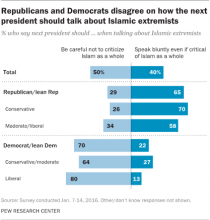
Republicans and Democrats divide sharply over views on Islam, Muslims, and how a U.S. president should label violent extremists. But Americans overall agree there’s a “a lot” of discrimination against Muslims living in the United States — and it’s rising — a new Pew Research survey finds.

As the political stage gets set for the 2016 U.S. presidential election, how should Christians engage?
One unexpectedly relevant guide can be found in the book of Judges, which more than any other book in the Bible, describes a divinely-inspired form of leadership similar to our own. Between the era in which God spoke through Moses, and the one in which God worked through kings like David, came an era — lasting over four centuries — during which God raised up a series of individuals who had no predefined lineage, accomplishment, or gender marking them as leadership material. These judges were not judicial so much as military leaders, fulfilling a role strikingly similar to that of the American president.
Another notable commonality Americans share with the Israelites of Judges is the crisis in which we find ourselves. Apostasy, from the Greek word apostasia, means “an abandonment of one’s previous faith.” Then as now, a nation was turning away from God.

We met over email in the spring of 2012. I had just co-launched a literary blog and our mutual friend introduced us as fellow writers. Stephanie and I immediately hit it off. Not only was she a gifted writer, Stephanie and I shared a similar sense of humor and sensibility. As we got to know each other and began to write with each other, we discovered a ridiculous number of similarities and common points of interest, including and especially, our shared Christian faith. To paraphrase C.S. Lewis, it was as though every other email was a “you too?” moment.
Then one day I wrote a piece that indicated my progressive political leaning. The 2012 presidential election was heating up and though the piece was not overtly political, it revealed my beliefs. Stephanie, it turned out, was a conservative.
This news wasn’t really a big deal to me — I am used to have friends and family who have different political beliefs, and I even got my first start in the blogging world as the token “progressive” Christian through a conservative friend’s blog. But things were getting heated with the election and we didn’t know each other that well.
Stephanie and I began to email back and forth about politics through the lens of faith, which tested whether we were Christians or ideologues first. We shared two things in common in holding our different political beliefs because: 1) we had both thought a lot about them, and, 2) shockingly, neither of us had an interest in destroying America. Eventually Stephanie and I decided to co-write a bipartisan series for our website, looking at partisanship through the lens of faith (summary: love for Jesus makes for fertile common ground).
After the election it was hard to ignore the mix of apocalyptic expressions of woe and the tone-deaf exclamations of victory. Each came with its own vilification of the other party. I found myself at parties with fellow progressives defending conservatives because the caricatures of them were plainly wrong, and I would be hurt if Stephanie didn’t defend me against caricatures of progressives.

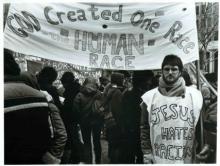
Time was when a determined minority vowed to change the nation’s collective mind about racial integration and the Vietnam War.
I was in that minority. We considered our cause just. We called our tactics “civil disobedience,” “grass-roots organizing,” “protest,” “civil rights,” “saving America.”
It’s a bit disingenuous now for us to lambaste a conservative minority for wanting the same leverage and for using the same tactics. “Civil disobedience” can’t be relabeled “obstructionism” just because the other side is using it.
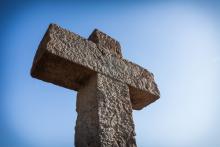
Facebook is breaking my heart.
As I survey the reactions of my fellow evangelicals to the Newtown tragedy, I have seen three strains of thought, each of which absolve us of any responsibility: (1) It would have been different if the principal or a teacher was armed; (2) If Americans care about the slaughter of innocent children, why don't they care more about abortion?; and (3) The secularization of school and society plays a role in these shootings. A few stray comments about mental illness have also floated around vaguely.
Absent from all of this analysis is any consideration of our own failure to do exactly what evangelicals should be all about: Evangelism, in the form of reaching out and giving meaning to lost souls like the loner kid who became the 20-year-old who committed these murders. If a relationship with God is what gives a young life a connection to community, a sense of humility and service, and a devotion to what is good, that is exactly what Adam Lanza needed.
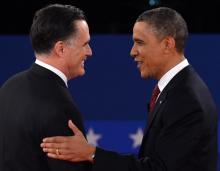
The presidential election is only weeks away… and it’s getting ugly out there. I mean … really ugly.
And before you think I’m just talking about the political process, the political parties, or the respective candidates, I was actually talking about you, me, us, and them … the people. And by people, I’m also especially talking about Christians.
Sometimes, I feel it would be appropriate to label how some Christians engage the presidential election season as “Christians Gone Wild."
Since there’s sure to be drama this week and next following the debates — and each day leading up to Election Day on Nov. 6, and likely some weeks afterward — I thought I’d share with you my 10 Commandments of the Election Season for Christians in hopes that it might speak some balance, sense, and perspective to any readers, not just during this election season but thereafter; not just in this country but in any country.
Why else am I sharing this?
Because I really want you to still respect yourself the morning after the election season.
Because I really want your friends to still respect you, too.
Know what I mean?
So, here are my 10 Commandments of the Election Season
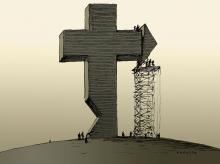
“Church folks are just too political!”
When people are asked why they have decided to leave the church, this has become an increasingly popular response. And, sadly, it is a particularly popular response for those in the 18-29 year old demographic. That we Christians have allowed ourselves to become too political and too partisan is a major contributor to the decline of the church.
Partisanship and its corrosive effects are not a new thing to the culture at large. However, more and more that cultural partisanship is infecting the church and gnawing away at the bonds which are supposed to hold them together. In the process, the church gets hijacked and redeployed for partisan ends, leaving those expecting better from the church disappointed.
In our own time the "jobs" rhetoric from both the right and the left ignores the power grabs and power differentials that led to the hemorrhaging of American jobs in the first place. The simple truth is that multinational corporations could make more money for their shareholders by outsourcing jobs to third-world countries so that is what they did.
This was not a moral dilemma for CEOs; it was a "sound business decision." And the gospel according to free-market capitalism (the USA's true religion) preaches that what is good for American business is good for America.
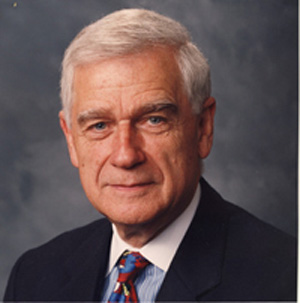 Mark O. Hatfield's political witness shaped a whole generation of students, teachers, pastors, and social activists in the evangelical community and beyond. The voice of Christians today who plead for social justice and peaceful alternatives to war would not have emerged with its strength and clarity in the 1970s without his leadership. His death underscores the vacuum of such spiritually rooted voices uncompromising in their commitments to peace and justice within the cacophony political rhetoric today.
Mark O. Hatfield's political witness shaped a whole generation of students, teachers, pastors, and social activists in the evangelical community and beyond. The voice of Christians today who plead for social justice and peaceful alternatives to war would not have emerged with its strength and clarity in the 1970s without his leadership. His death underscores the vacuum of such spiritually rooted voices uncompromising in their commitments to peace and justice within the cacophony political rhetoric today.
One of my life's greatest privileges and joys was to work as an assistant to Senator Mark O. Hatfield for nearly a decade, from 1968 to 1977. I saw first-hand what courageous leadership, combined with unswerving compassion and civility, looked like within the political life of that turbulent and formative era. Those experiences are shared in my book, Unexpected Destinations (Eerdmans).
Yesterday, a group of more than 130 former legislators, both Republicans and Democrats, released a letter urging for civility and encouraging candidates, once elected, to focus on cooperation to face our country's greatest challenges. The letter said:
Yesterday, I posted a blog about how to get beyond labels when engaging in discourse with another individual. Today I'd like to share some tips on how to get beyond labels and have civil discourse with a group.